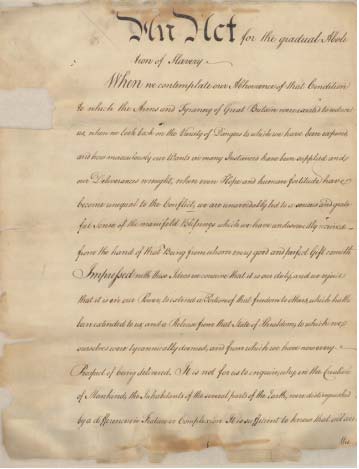On March 1, 1780, the state of Pennsylvania, led by courageous legislators, became the first in the United States to abolish slavery when it passed the Gradual Abolition Act, a law freeing all enslaved people born after that date. This momentous occasion set an important precedent for other states to adopt anti-slavery laws, inspiring a wave of change.
The legislation was drafted in 1779 by George Bryan, a judge and Vice President of the Pennsylvania Supreme Executive Council. Bryan, a staunch advocate for the abolition of slavery, played a pivotal role in shaping the provisions of the law. It was submitted to the General Assembly in February of 1770 and focused primarily on children born into slavery. Under his proposed law, these children would receive freedom after serving their masters for a set amount of time. However, some assembly members opposed the bill, fearing how neighboring states would react, thus weakening the war effort. Others feared that newly freed slaves would join the British forces when the time came to fight.
Despite some concerns, the 14-section Gradual Abolition Act passed on March 1, 1780. These sections were significant as they included the requirements for every enslaved person in the state to be registered each year, a provision that aimed to keep track of the number of enslaved individuals and monitor their conditions. The act also provided emancipation for all children born in Pennsylvania, regardless of racial background, marking a significant step towards racial equality. The bill also prevented the importation of enslaved people and non-residents from transporting their slaves into the state for more than six months, a provision that aimed to curb the spread of slavery. The bill also voided any previous or existing legislation that discriminated against African Americans, a provision that aimed to rectify past injustices. The bill passed the General Assembly with a vote of 34 to 21, demonstrating the growing support for anti-slavery measures.
Although this particular law only impacted those born into slavery in Pennsylvania, its broader impact on efforts toward emancipation throughout America was profound. It showed other states that it was indeed possible to rid themselves of this abhorrent institution without immediately ripping apart families or wreaking economic havoc. The law acted as a powerful motivation for slowly shifting attitudes among legislators and citizens alike about how slavery could be abolished without too much disruption or violence, offering a hopeful vision for the future of America.
The passing of this act was not just a victory for Pennsylvania but a significant boost to burgeoning anti-slavery movements around the country. It gave them newfound strength and encouragement, demonstrating the power of collective action as they sought ways to rally support from various states to push forward legislation banning slavery altogether—something that eventually came to pass with the Thirteenth Amendment some 85 years later.

